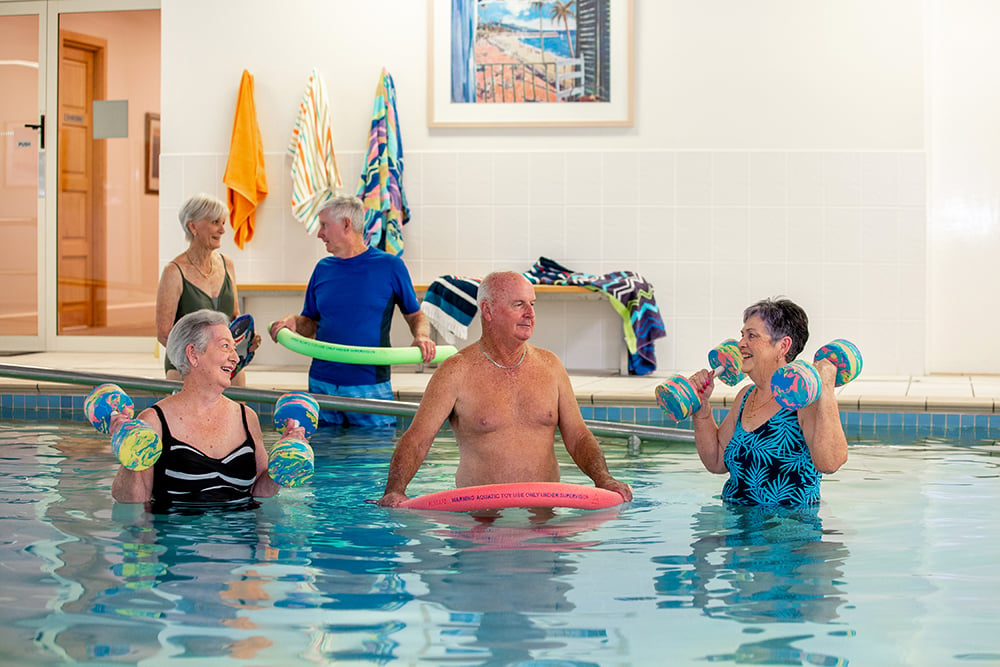Tips to help you live a happy and meaningful life
Your retirement years should be the best of your life. You’ve worked hard, possibly raised a family, now it’s time for you! Retirement brings more time for growing your social networks, pursuing interests, and perhaps doing a little travel.
The best way to live a happy, healthy, satisfying, and independent life is to stay healthy, and taking care of your mental health is certainly a priority.
Here are some tips for improving your mental health throughout your retirement years.
Take care of your body
Research has proven a strong correlation between your physical health and your mental health. As you age, it’s more important than ever to make your physical health a priority in order for your brain to continue functioning well.
Here are some of the fundamentals for maintaining your physical health in retirement:
- Keep your weight in the healthy range
- Exercise regularly – preferably daily
- Eat a healthy diet
- Reduce the stress in your life
- Improve your cholesterol and blood sugar levels
- Manage your blood pressure
- Stop smoking
- Limit your alcohol consumption to two glasses daily
- Exercise daily
Moving your body benefits your mind. Remember how you feel after walking, cycling, or swimming. You may be tired, but you feel more alive! That’s because when you exercise, your body releases endorphins, a natural chemical that makes you feel happier and more positive and wards off depression, anxiety, and stress.

Regular exercise can also improve your cholesterol levels, lower your blood pressure, and help maintain healthy blood sugar levels – all important in helping your body (and your mind) to keep functioning well.
There are many types of exercise you can safely do as you get older. Rather than exercising because you ‘should,’ seek out activities you find enjoyable, and you’ll gain even more benefits.
Here are some popular ways retirees stay fit:
- Walking
- Cycling
- Yoga
- Chair Yoga
- Tai Chi
- Pilates
- Swimming
- Water Aerobics
- Resistance band workouts
- Body weight workouts
- Dumbbell strength training
- Cycling
- Tennis
- Bowls
- Golf
- Dancing
- Hiking
- Walking your dog!
All you need is 30 minutes of moderate physical activity a day for the benefits to show. If you’re inactive now, start with a walk around the block, and work your way up from there.
If you find it difficult to get started, try joining a group exercise class or enlist an exercise buddy to help you stay focused and committed.

Eat a healthy diet
By this stage of your life, you probably know the types of foods that support you in staying healthy, and those that don’t. There are certain foods that may assist with healthy brain function. Fish and fish oil are high on the list of brain food along with a diet of mostly fruit, vegetables, nuts, olive oil and plant-based proteins.
Consult your doctor or natural health practitioner for advice on which diet or supplements may help you maintain a healthy brain.
Get plenty of sleep
Getting seven to eight hours of quality sleep every night is as important as getting enough exercise. Lack of sleep can weaken both your decision-making ability and your short and long-term memory. Over time, too little sleep can contribute to cognitive decline and increase your risk for developing dementia.
A good night's sleep helps improve concentration and memory formation. Sound sleep allows your body to repair any cell damage that may have occurred during the day. It also boosts your immune system, helping your body to naturally prevent disease.
Spend time in nature
Nature can work wonders for your mental wellbeing – whether it’s simply doing a little gardening, taking a stroll in nature, swimming in the ocean, or throwing a line in.
Along with the physical benefits of time spent in nature, the restorative effects support mental health and wellbeing. In retired people, studies show that physical activity in nature can be linked to reduced levels of stress, improved cognitive function, better moods, and a decreased chance of depression.
To get the most from your time in nature, try to remain ‘present’. You can do active meditation by stopping to take deep breaths, looking closely at your surroundings, and listening to the sounds of nature.
.jpg?width=1500&height=1000&name=20190909_07283919%20(1).jpg)
Keep your brain active
Just as exercise improves your physical health, brain workouts strengthen your mind, helping to boost your memory and thinking skills. Incorporating mental activities into your daily routine will help exercise your brain.
- Reading on a regular basis keeps the mind active. Joining a book club also provides social stimulation.
- Writing such as poetry, creative stories, letters, cards, emails, or blog posts
- Crosswords, Sudoku, and word games all help stimulate your brain
- Jigsaw puzzles will help build your brain’s problem-solving areas
- Games like chess, bridge, mah-jong, scrabble, or fun games with friends or family
Do something creative every day
Creative pursuits can be relaxing, stimulating and enjoyable while helping your brain to generate new cells.
Here are some creative ideas for supporting your brain.
- Playing or learning a musical instrument
- Singing in a choir can help brain function and bring great joy
- Drawing, painting, and craft are all great for the mind
- Learning dance steps is good for your mind… and for making friends!
- Google your areas of interest to find local or online classes or special interest groups
Stay connected socially
Having a supportive social circle in retirement has been proven to improve blood pressure, lower the risk of dementia, and extend your life expectancy. If you have good friends you connect with regularly and feel a part of your community you will inevitably feel happier.
You don’t need a lot of friends to feel content. If, however, you only have one very close friend, it can be particularly difficult if they pass away to reach out and start again.
Retirement is a great time to broaden your social circles and in turn improve your mental, emotional, and spiritual health.
Retirement can be the best time of your life
At Renaissance Retirement Living at beautiful Victoria Point we want you to remain mentally active so you can live life to the full. Our residents certainly do!
Our resort-style retirement village community offers a host of facilities and activities to help keep your mind and body moving and healthy.
Find out more at one of our monthly small group information sessions where we will answer all your questions about retirement living. You can take a tour of our wonderful community and chat with some of our residents and find out why they love retirement living at Renaissance.
Call today on (07) 3820 7700 or contact us to book a spot at our next information session and morning tea. We would love to meet you!


